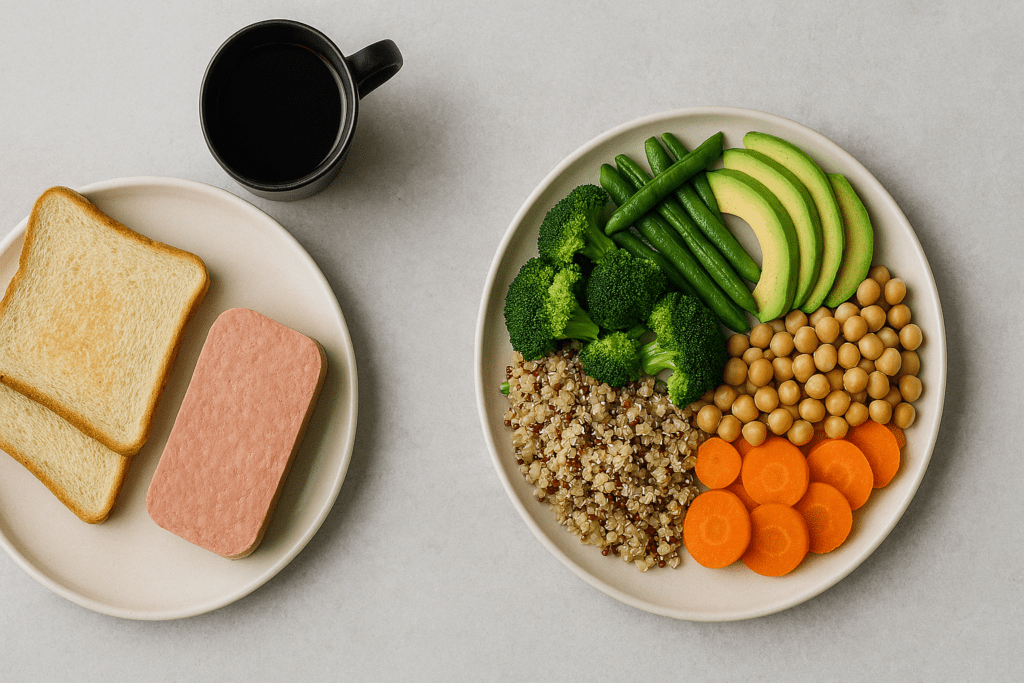In the ever-evolving landscape of health and nutrition, fad diets frequently emerge with bold promises of rapid results. Among the most talked-about regimens in recent years is the Kaiser 3 Day Diet—a strict diet plan that claims to promote quick weight loss through highly controlled caloric intake and limited food choices. Similarly, minimalist approaches such as the 3 food diet have sparked curiosity for their simplicity and apparent discipline. But in an era where plant-based lifestyles are gaining scientific credibility and popularity for their long-term health benefits, it is worth exploring whether these strict dietary models align—or conflict—with the principles of whole-food, plant-based nutrition.
You may also like: Plant Based Diet vs Standard American Diet: What the Latest Studies Reveal About Long-Term Health Outcomes
Understanding the Kaiser 3 Day Diet: Origins, Structure, and Popularity
The Kaiser 3 Day Diet originated as a short-term weight loss solution allegedly designed for patients preparing for medical procedures. While its precise origins are difficult to verify, the diet gained traction in various weight loss communities and has often been circulated through unofficial channels, including blogs and forums. The structure of the Kaiser 3 Day Diet is rigid and repetitive, typically comprising three daily meals of specific, low-calorie food items consumed for a span of three days. The limited duration appeals to those seeking rapid, short-term results, especially before events or appointments where quick weight reduction is desired.
Despite its popularity, the diet is controversial in medical and nutritional circles. Critics argue that it lacks sufficient nutrients and diversity, while proponents claim it jumpstarts metabolism and promotes detoxification—though the latter is not supported by strong scientific evidence. The diet is classified as a strict diet not only because of its restrictive food list but also due to the strict adherence required to follow the plan effectively. This rigidity raises important questions about its sustainability and potential consequences, particularly for individuals pursuing a whole-food, plant-based lifestyle.

The 3 Food Diet: Minimalism in Nutrition or Oversimplification?
The 3 food diet, as its name suggests, is based on the premise of consuming only three different food items for an extended period. Unlike the Kaiser 3 Day Diet, which typically lasts only a few days, the 3 food diet can vary in duration and content based on individual goals. Some variations encourage eating three nutrient-dense foods, such as sweet potatoes, lentils, and spinach, while others may focus on high-protein or low-carb options. The appeal lies in its simplicity, potential for rapid weight loss, and ease of meal planning.
However, nutrition experts caution against the long-term use of any strict diet that drastically limits food variety. Essential micronutrients, phytonutrients, and dietary fiber are often overlooked in such plans. The lack of diversity may impair gut health, reduce metabolic flexibility, and contribute to nutrient deficiencies over time. While the 3 food diet might seem to support clean eating or even mimic plant-based minimalism, it frequently sacrifices nutritional completeness for simplicity, potentially leading to negative health outcomes.
When evaluating whether the 3 food diet aligns with a plant-based lifestyle, it is essential to consider the quality and source of the chosen foods. A well-planned version of the 3 food diet can technically be plant-based, but it would likely fail to meet long-term nutritional needs without strategic supplementation and expert oversight.

The Philosophy of Plant-Based Nutrition: Diversity, Wholeness, and Sustainability
Whole-food, plant-based nutrition is built on the foundation of consuming a diverse array of minimally processed plant foods, including fruits, vegetables, legumes, whole grains, nuts, and seeds. The philosophy goes beyond individual food choices to emphasize sustainability, ethical considerations, and long-term health. Numerous studies have shown that a diet rich in whole plant foods can reduce the risk of chronic diseases such as cardiovascular disease, type 2 diabetes, and certain types of cancer.
Unlike a strict diet, which often restricts food groups or imposes rigid rules for short-term gain, plant-based nutrition encourages long-term lifestyle changes that support both personal and planetary health. It promotes food variety as a key element of nutritional adequacy, recognizing that different plant foods offer unique combinations of essential vitamins, minerals, antioxidants, and fiber. This emphasis on diversity stands in stark contrast to the restrictive nature of both the Kaiser 3 Day Diet and the 3 food diet.
Moreover, the plant-based approach integrates well with mindful eating, culinary enjoyment, and cultural food practices, making it more adaptable and enjoyable in the long run. These factors play a critical role in adherence and sustainability, which are often overlooked in the design of most strict diet programs. As such, any dietary model that severely limits food groups—especially over extended periods—may be inherently incompatible with plant-based living.
Can a Strict Diet Be Plant-Based?
The term “strict diet” encompasses a wide spectrum of approaches, from medically supervised therapeutic diets to trendy food regimens found on social media. While the defining characteristic is typically a high level of restriction—whether in calories, food types, or meal timing—it is theoretically possible for a strict diet to be plant-based. For example, some individuals adopt a strict vegan ketogenic diet or a highly regimented raw food diet, both of which are technically plant-based yet involve substantial limitations.
However, the issue lies in the degree of flexibility and nutritional adequacy. Plant-based nutrition advocates for balance and variety, which strict diets often disregard. The rigidity inherent in most strict diets may also pose psychological challenges, including disordered eating patterns or food anxiety. In contrast, plant-based diets tend to promote a more positive and intuitive relationship with food, focusing on nourishment rather than deprivation.
Moreover, adherence to a plant-based lifestyle often requires some level of education and awareness about food sourcing, preparation, and nutrient composition. When this educational component is missing—as is often the case with quick-fix strict diets—the risk of malnutrition or inadequate caloric intake increases. Thus, while a strict diet can be aligned with plant-based principles in theory, it is rarely sustainable or health-promoting without careful planning.

Evaluating the Nutritional Adequacy of the Kaiser 3 Day Diet
The Kaiser 3 Day Diet typically includes foods like toast, canned tuna, boiled eggs, and black coffee. While it may achieve temporary weight loss due to its low-calorie content, it is not designed for nutritional balance. The lack of dietary fiber, antioxidants, and plant-based nutrients raises concerns about its suitability for individuals pursuing a whole-food, plant-based lifestyle.
For instance, the diet includes animal-based protein sources and excludes a wide range of whole plant foods, thereby contradicting the core values of plant-based nutrition. Additionally, the reliance on processed or low-quality food items like white toast and canned meat undermines the goal of maximizing nutrient density. These limitations become particularly evident when comparing the Kaiser 3 Day Diet to the nutritional diversity found in plant-based eating patterns such as the Mediterranean or DASH diets.
From a health perspective, the diet also falls short in supporting long-term metabolic health. Its repetitive and restrictive nature can impair metabolic flexibility, reduce muscle mass, and compromise digestive health due to insufficient fiber intake. While proponents may argue that it serves as a detox or reset, there is no credible scientific evidence to support such claims. The human body is naturally equipped with organs like the liver and kidneys that detoxify without the need for extreme dietary interventions.
The Psychology Behind Dieting: Motivation, Restriction, and Sustainability
One of the most overlooked aspects of any dietary pattern is the psychological impact it has on the individual. Strict diets, including the Kaiser 3 Day Diet and the 3 food diet, often foster a mindset of control, discipline, and rapid transformation. While this can be motivating in the short term, it may also lead to unsustainable eating habits, guilt, and a cycle of yo-yo dieting.
In contrast, whole-food, plant-based lifestyles tend to support intrinsic motivation driven by long-term health goals and ethical considerations. This psychological shift—from a focus on deprivation to one of abundance and well-being—can lead to more sustainable changes in behavior. The emphasis on food enjoyment, cooking skills, and community-based eating also plays a significant role in reinforcing positive habits.
Understanding the psychological toll of a strict diet is crucial for evaluating its overall impact. While some individuals may thrive on structure, others may find it restrictive and isolating. This highlights the importance of choosing a dietary model that aligns not just with nutritional science but also with personal values and mental well-being.

Real-World Applications: Transitioning from Fad Diets to Plant-Based Living
For those who have experimented with the Kaiser 3 Day Diet or the 3 food diet and are considering a shift to a more sustainable way of eating, transitioning to a plant-based lifestyle can offer numerous benefits. The key lies in gradually replacing restrictive behaviors with more balanced habits that prioritize health, enjoyment, and long-term success.
This transition might begin with increasing the variety of plant foods in the diet, learning how to prepare satisfying plant-based meals, and understanding the principles of nutrient density. Practical steps such as meal prepping, shopping with a plant-forward mindset, and seeking guidance from a registered dietitian can ease the process. Importantly, this shift should be viewed not as a temporary fix but as a lifelong journey toward better health.
Embracing a plant-based lifestyle does not require perfection or rigid adherence to labels. Instead, it encourages continuous learning, self-compassion, and adaptability. By focusing on the benefits of whole, minimally processed foods and staying attuned to individual needs, one can gradually move away from the limitations of strict diets and toward a more nourishing and sustainable way of life.
Frequently Asked Questions: The Kaiser 3 Day Diet, 3 Food Diet, and Plant-Based Nutrition
Can the Kaiser 3 Day Diet be adapted for people with plant-based preferences?
Yes, but the adaptation process is complex and requires careful attention to nutrition. The original Kaiser 3 Day Diet relies heavily on animal-based proteins and low-fiber, processed foods, which directly contradict plant-based principles. However, by swapping items like canned tuna for lentils or tofu, and toast for whole-grain alternatives, one could create a plant-centered version. The challenge lies in maintaining the low-calorie count while ensuring protein adequacy and nutrient density—particularly important for those adhering to a strict diet format. Although the modified version might resemble the original structure, it’s essential to work with a dietitian to avoid common pitfalls like iron and B12 deficiencies.
What psychological effects can the 3 food diet have on long-term eaters?
While the 3 food diet may seem straightforward, its psychological effects can be surprisingly complex over time. Repeating only three foods can lead to sensory monotony, reducing meal satisfaction and increasing food fatigue. Over weeks or months, this monotony may provoke disordered eating behaviors or anxiety around social eating situations. Unlike a strict diet with defined endpoints, the 3 food diet can foster obsessive thinking around food rules and compliance. Mental health professionals increasingly emphasize that dietary diversity supports not just nutritional adequacy but also cognitive and emotional well-being, which is why rigid frameworks like this can become problematic over time.

How does the Kaiser 3 Day Diet compare to intermittent fasting from a metabolic standpoint?
The Kaiser 3 Day Diet and intermittent fasting both aim to trigger weight loss but through different metabolic mechanisms. The Kaiser plan focuses on sharp caloric reduction, creating an energy deficit that encourages short-term fat loss. Intermittent fasting, on the other hand, often maintains regular calorie levels while manipulating meal timing to optimize insulin sensitivity and fat oxidation. While both may qualify as a strict diet, the Kaiser approach lacks the circadian alignment and metabolic flexibility benefits associated with time-restricted eating. Furthermore, intermittent fasting tends to be more sustainable and adaptable for individuals on a plant-based diet, especially when paired with nutrient-rich meals.
Are there risks of micronutrient deficiencies in the 3 food diet even when plant-based?
Absolutely—regardless of whether the 3 food diet is plant-based or not, the limited food variety drastically reduces micronutrient diversity. For example, relying solely on oats, bananas, and almond butter may provide energy and some fiber, but it will lack critical nutrients such as calcium, zinc, vitamin B12, and omega-3 fatty acids. These deficiencies can compound over time, leading to symptoms like fatigue, impaired cognition, and compromised immunity. Even the most strategic trio of plant-based foods cannot fully mimic the complexity of a well-balanced diet. Therefore, the 3 food diet—despite its simplicity—should be approached with caution and not be used beyond short-term contexts.
What are some ethical concerns with the Kaiser 3 Day Diet for plant-based eaters?
For individuals committed to plant-based ethics, the original Kaiser 3 Day Diet poses serious concerns. Not only does it rely on animal-based ingredients, but it also encourages the consumption of low-cost, industrially farmed products that often involve unsustainable agricultural practices. In contrast, many who follow a plant-based lifestyle prioritize environmental stewardship, animal welfare, and food justice. From this perspective, adopting a strict diet like the Kaiser plan—even temporarily—can feel like a moral compromise. A plant-based adaptation would need to incorporate not just nutritional substitutions, but also align with values around humane sourcing and ecological responsibility.
How do social dynamics shift when someone is on a strict diet like the 3 food diet?
Social situations can become significantly more complex when someone adheres to a strict diet such as the 3 food diet. Attending dinners, traveling, or even participating in workplace lunches often necessitates either breaking the diet or making others accommodate unusual restrictions. This can lead to social isolation, heightened stress, or even resentment from peers and family. Over time, these dynamics may affect relationships and reduce overall life satisfaction, undermining any short-term health gains achieved through dietary control. It’s vital for anyone considering such a limited dietary plan to weigh these social costs alongside nutritional concerns.
Can strict diet plans be used therapeutically within plant-based medicine?
Strict diet protocols have their place in therapeutic settings, including within plant-based frameworks, but they must be administered with caution and professional oversight. For instance, elimination diets are often used to identify food allergies or intolerances, while medically supervised fasting has been explored for managing autoimmune conditions. When applied in plant-based medicine, these regimens focus on temporary restriction followed by gradual reintroduction of diverse, whole foods. Unlike fad versions of the Kaiser 3 Day Diet or self-imposed 3 food diets, therapeutic plans prioritize long-term recovery, nutrient restoration, and holistic health. This distinction is crucial for ensuring that strict diet use remains evidence-based and safe.
What are some emerging plant-based alternatives to short-term strict diets?
As awareness grows around the limitations of strict diet plans, several innovative plant-based approaches have emerged to offer structured support without extreme restriction. One example is the 7-day whole-food reboot, which emphasizes fiber-rich, colorful meals while limiting processed foods. Another rising trend is the plant-based anti-inflammatory protocol, designed to alleviate symptoms of chronic disease without sacrificing food variety. These methods differ from the Kaiser 3 Day Diet in that they promote nutritional abundance and personalization rather than caloric austerity. They are especially useful for people transitioning away from rigid diets like the 3 food diet but who still want a defined structure to guide their choices.
How can someone transition off the 3 food diet without experiencing rebound weight gain?
Rebound weight gain is a common concern after ending a highly restrictive regimen like the 3 food diet. To mitigate this, it’s important to reintroduce new foods gradually, focusing on high-volume, low-calorie plant-based items such as leafy greens, legumes, and fruits. The goal is to restore nutritional diversity while maintaining satiety and blood sugar stability. Building meals around fiber and plant protein can reduce hunger spikes and help the body adjust metabolically to a wider intake. Rather than seeing the end of the 3 food diet as a return to old habits, it should be treated as a transition into a sustainable, plant-rich routine.
Is the appeal of the Kaiser 3 Day Diet more psychological than physiological?
In many cases, yes—the appeal of the Kaiser 3 Day Diet lies more in its promise of control and quick results than in any long-term physiological benefits. The clearly defined rules and three-day timeframe offer a sense of mastery that can be psychologically rewarding, especially for those struggling with dietary inconsistency. However, this sense of control is often fleeting and may be followed by feelings of guilt or failure if results don’t match expectations. For plant-based eaters, the disconnect between values and practice can further complicate this emotional equation. Understanding these psychological underpinnings can help individuals recognize that lasting health changes are more often achieved through consistency, education, and self-compassion than through strict dietary punishment.

Conclusion: Can the Kaiser 3 Day Diet or a 3 Food Diet Support Long-Term Plant-Based Health?
As the popularity of the Kaiser 3 Day Diet and the 3 food diet continues to grow among those seeking quick results, it is essential to critically examine their alignment with plant-based health principles. While these regimens may serve as short-term experiments in discipline or calorie control, they fall short of meeting the nutritional, psychological, and ethical standards of whole-food, plant-based nutrition.
Strict diets, by design, are focused on restriction rather than abundance, which contradicts the diverse and inclusive philosophy of plant-based living. The Kaiser 3 Day Diet, with its limited food choices and reliance on animal products, lacks the fiber, phytonutrients, and variety essential for long-term well-being. Similarly, the 3 food diet oversimplifies nutrition to the point of compromising health, especially when practiced without professional oversight or nutritional knowledge.
In contrast, a whole-food, plant-based lifestyle offers a robust and evidence-based framework for achieving optimal health. It supports not only physical wellness but also mental and emotional resilience, providing a more holistic approach to eating and living. For individuals seeking a truly sustainable and nourishing path forward, moving beyond the confines of a strict diet and embracing the principles of plant-based nutrition may be the most empowering choice.
Ultimately, understanding the limitations of fad diets and appreciating the richness of plant-based eating can lead to more informed and confident dietary decisions. While short-term solutions may offer momentary satisfaction, the long-term rewards of a varied, plant-centered diet are far more impactful—for the individual and for the planet.
Was this article helpful? Don’t let it stop with you. Share it right now with someone who needs to see it—whether it’s a friend, a colleague, or your whole network. And if staying ahead on this topic matters to you, subscribe to this publication for the most up-to-date information. You’ll get the latest insights delivered straight to you—no searching, no missing out.
Further Reading:
What is the military diet and does it work?
What Is the Vegan Military Diet, and Should You Try It?
Disclaimer
The information contained in this article is provided for general informational purposes only and is not intended to serve as medical, legal, or professional advice. While NewsHealthWatch strives to present accurate, up-to-date, and reliable content, no warranty or guarantee, expressed or implied, is made regarding the completeness, accuracy, or adequacy of the information provided. Readers are strongly advised to seek the guidance of a qualified healthcare provider or other relevant professionals before acting on any information contained in this article. NewsHealthWatch, its authors, editors, and contributors expressly disclaim any liability for any damages, losses, or consequences arising directly or indirectly from the use, interpretation, or reliance on any information presented herein. The views and opinions expressed in this article are those of the author(s) and do not necessarily reflect the official policies or positions of NewsHealthWatch.

